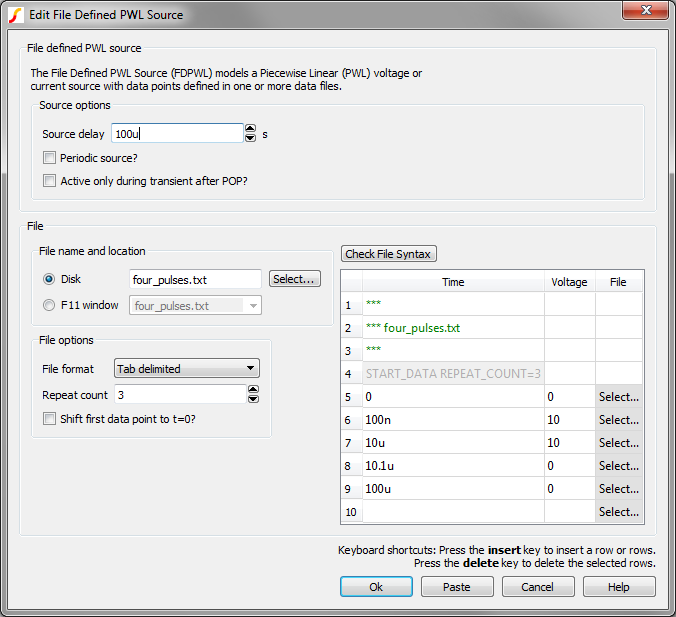EditFileDefinedPWLDialog Function
Opens the dialog box shown below allowing the entry of X-Y pairs intended for the
definition of file defined piece-wise linear sources.

Arguments
| Number | Type | Compulsory | Default | Description |
| 1 | string array | Yes | file content | |
| 2 | string | No | Source options | |
| 3 | string | No | Options |
Argument 1
File content used to initialise table represented as a string array. The above example would be displayed after a call to:
Show EditFileDefinedPWLDialog(['***' , '*** default_file.txt' , '***' , 'START_DATA' , '0 0' , '10u 0' , '20u 1' ] , [ '0' , '0' , '0' , " , 'Disk' ] )
Argument 2
| Index | Description |
| 0 | Source delay parameter |
| 1 | Checkbox state for Periodic source checkbox. |
| 2 | Checkbox state for Active only during transient after POP? checkbox. |
| 3 | Filename. |
| 4 | File location used to initialize the radio selection. 'Disk' or 'F11'. |
| 5 | Reference designator for souce, used in error messages. |
| 6 | Pipe (|) delimited list of F11 filenames used to populate the F11 window combobox. |
Argument 3
| Index | Description |
| 0 | Box caption. Default: 'Edit File Defined PWL Source' |
| 1 | Label for X-Values column. Default: 'Time' |
| 2 | Label for Y-Values column. Default: 'Value' |
| 3 | Help context id. Default: '-1' (no help button shown) |
| 4 | Minimum number of segments. Default = '2' |
| 5 | Maximum number of segments. Default = '100001' |
Returns
Return type: string array
| Index | Description |
| 0 | Source delay parameter |
| 1 | Checkbox state for Periodic source checkbox. |
| 2 | Checkbox state for Active only during transient after POP? checkbox. |
| 3 | Filename. |
| 4 | File location radio button state. 'Disk' or 'F11'. |
The file contents start at the second element (index=1). You can slice the file contents out of the return array with the Range function:
Let fileContents = Range( return , 1 )
String arrays can be written to file with the Show command.
Show /plain /file points.txt fileContents
| ▲Function Summary▲ | ||
| ◄ EditDigInitDialog | EditFreeTextDialog ▶ | |